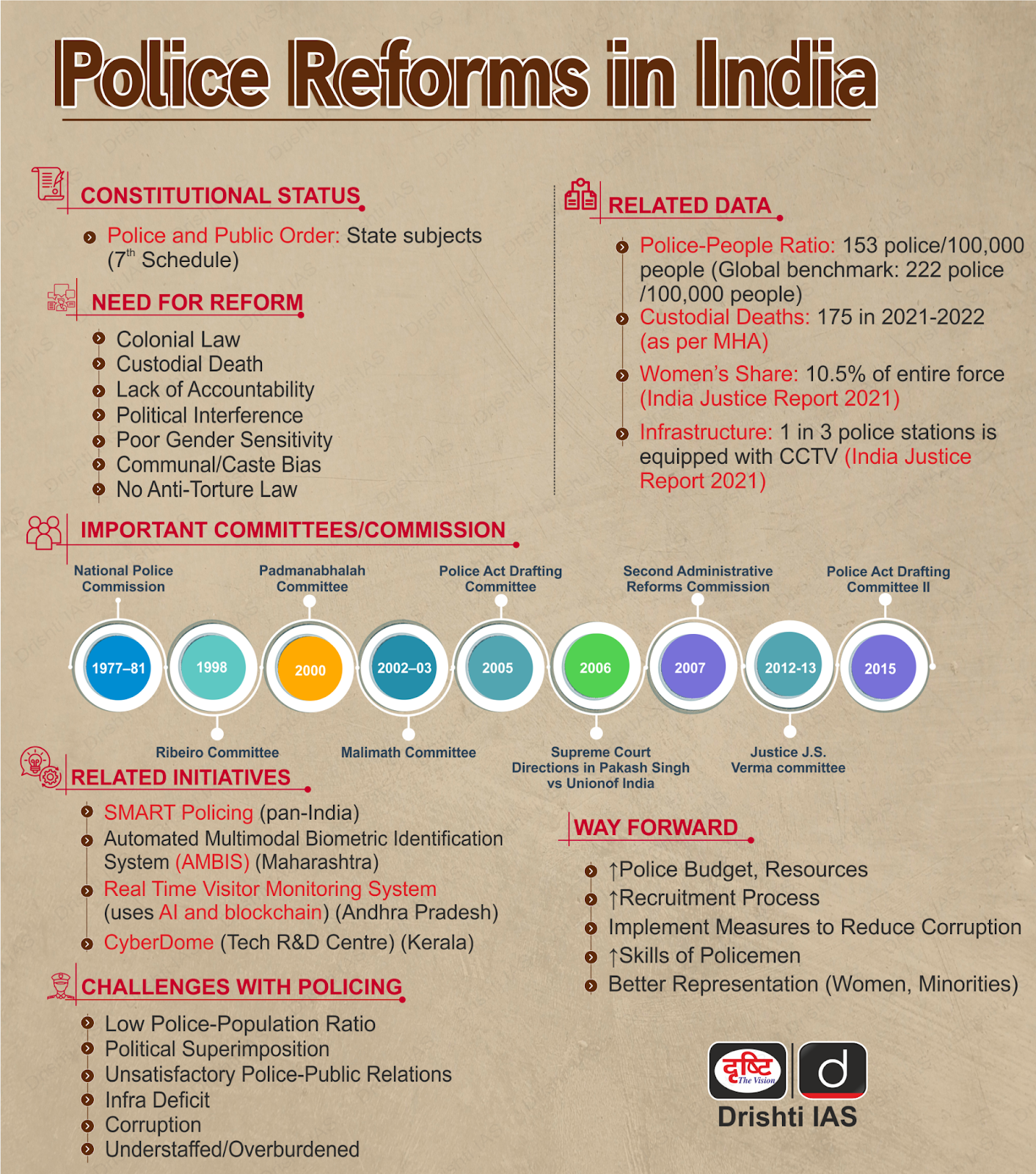Governance
The Need for a Reliable Code of Police Investigation in India
- 13 Oct 2023
- 7 min read
For Prelims: Supreme Court of India, Malimath Committee, Police Reforms
For Mains: Challenges Related to Policing in India, Committees/Commissions on Police Reforms.
Why in News?
In a recent ruling, the Supreme Court (SC) of India stressed the necessity for a “consistent and dependable code of investigation” to prevent legal loopholes leading to the acquittal (found not guilty of a crime or wrongdoing) of the guilty.
- The observations came after the court acquitted 3 accused in a 2013 kidnap and murder case, citing flaws in the police investigation.
What are the SC's Observations Regarding Police Investigations in India?
- The court highlighted the 2003 report by Justice V.S. Malimath Committee on Reforms of the Criminal Justice System, which emphasised that the “successful prosecution of the guilty depends on a thorough and careful search for truth and collection of evidence which is both admissible and probative”.
- The court referred to a Law Commission of India report in 2012 that the reasons for a low rate of conviction included “inept, unscientific investigation by the police and lack of proper coordination between police and prosecution machinery.”
What is the Need for Consistent and Dependable Code of Police Investigation in India?
- To prevent lapses in police probes that lead to the acquittal of the guilty on technical grounds, as highlighted by the Supreme Court.
- To improve the standards of investigation and evidence collection, which are often inept and unscientific, as noted by the Law Commission of India.
- To enhance the credibility and legitimacy of the criminal justice system, which is often marred by corruption, political interference, and human rights violations.
- To ensure the successful prosecution of the offenders, especially in cases involving serious crimes, such as murder, rape, terrorism, etc.
- To protect the rights and interests of the victims, witnesses, and accused, who often face harassment, intimidation, and coercion during the investigation process.
What are the Malimath Committee's Recommendations for Police Investigation in India?
- About:
- The Malimath Committee was established by the Ministry of Home Affairs in 2000, which aimed to reform India's criminal justice system. It presented its recommendations in its report titled as the Report of the Committee on Reforms of the Criminal Justice System in 2003.
- The Committee was headed by Justice V.S. Malimath, former Chief Justice of Karnataka and Kerala High Courts.
- The Committee had opined that the existing system “weighed in favor of the accused and did not adequately focus on justice to the victims of crime.”
- Recommendations for Police Investigation:
- The panel recommended borrowing features from the inquisitorial system of investigation, seen in countries like Germany and France, where a judicial magistrate oversees the investigation.
- The Committee suggested hiving off the investigation wing from Law and Order.
- It also recommended setting up of a National Security Commission and State Security Commissions. To improve the quality of investigations.
- It suggested a slew of measures, including the appointment of an Additional. SP in each district to maintain crime data, organisation of specialised squads to deal with organised crime, and a team of officers to probe inter-state or transnational crimes, and setting up of a Police Establishment Board to deal with posting, transfers, and so on.
- Police custody is now limited to 15 days. The Committee suggested this be extended to 30 days and an additional time of 90 days be granted for the filing of charge sheets in case of serious crimes.
Criminal Justice System
- The criminal justice system is the set of laws, processes, and institutions that aim to prevent, detect, prosecute, and punish crimes while ensuring the rights and safety of all people.
- It has four subsystems:
- Legislature (Parliament)
- Enforcement (Police)
- Adjudication (Courts)
- Corrections (Prisons, Community Facilities)
- India's criminal justice systems have evolved under different rulers, during British rule, criminal laws were codified in India, which remain largely unchanged even today. Later the Indian Penal Code (IPC) was drafted in 1860, in the wake of the first law commission established in 1834 under the Charter Act of 1833.
- In line, the Code of Criminal Procedure (CrPC) provides procedures for administering criminal law in India. It was enacted in 1973 and became effective on 1 April 1974.
UPSC Civil Services Examination, Previous Year Question (PYQ)
Prelims:
Q. For which one of the following reforms was a Commission set up under the Chairmanship of Veerappa Moily by the Government of India? (2008)
(a) Police Reforms
(b) Tax Reforms
(c) Reforms in Technical Education
(d) Administrative Reforms
Ans: (d)
Mains
Q.1 National Human Rights Commission (NHRC) in India can be most effective when its tasks are adequately supported by other mechanisms that ensure the accountability of a government. In light of above observation assess the role of NHRC as an effective complement to the judiciary and other institutions in promoting and protecting human rights standards. (2014)





